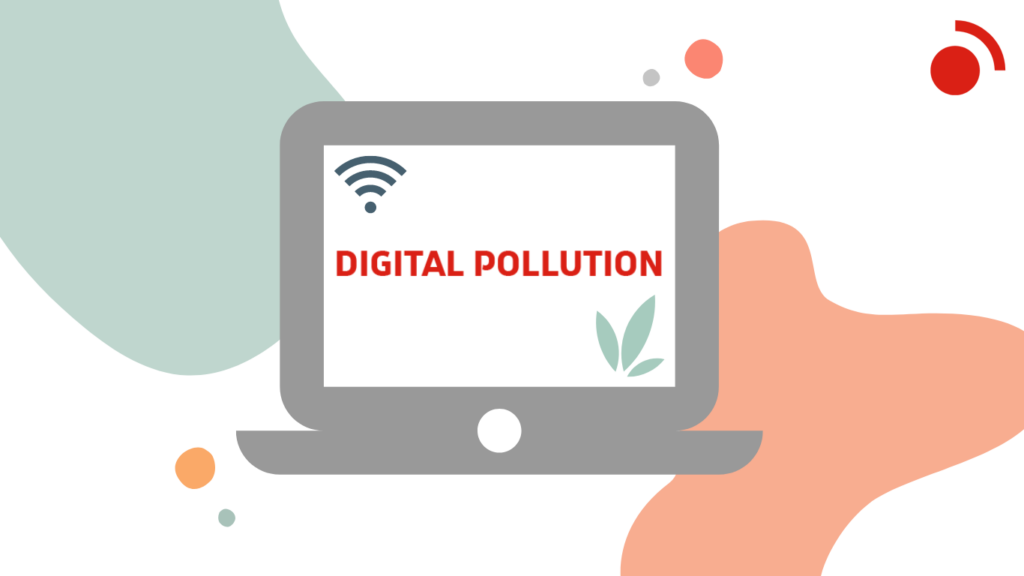Digital pollution: 10 solutions to take action

Were you aware that every single interaction made on the Internet travels thousands of kilometers before reaching its recipient? Can you imagine how this impacts our planet?
Even if we generally associate the digital sector with dematerialization and therefore with ecology, many studies and reports, notably by ADEME, The Shift Project, or Greenpeace, have alerted us of the ecological impact and energy consumption of infrastructures due to digital use.
First of all, what is digital pollution?
Digital pollution is not only the use of digital equipment, it is above all the means used to manufacture this equipment. In short, digital pollution refers to all forms of pollution generated by the computer industry.
From the manufacturing of digital devices that require the use of rare metals from all over the world, the storage and transfer of data via data centers that require a lot of electricity, to the electronic waste that often escapes recycling: digital technology represents a real human, energetic and ecological cost.
Digital pollution in numbers…
Digital pollution represents :
- 4.2% of the primary energy consumed by humanity (of which a good part is hydrocarbons and coal)
- 5.5% of the electricity produced in the world
- 0.2% of available water
- 3.8% of the world’s greenhouse gasses
However, only 57% of the world’s population surfs the Internet. This means that the number of users is not likely to decrease over time. It is therefore essential to act now so that we can continue to benefit from all these technologies in the long term.
Among our most polluting digital uses there are:
- video viewing: 80% of web data
- social networks: 5% of global internet traffic
- our mailbox : 1 mail = 15 000 km traveled
- our searches on the engines: 1 year of internet searches = 120 000 GW
What actions can we take to change this?
Now that you know more about digital pollution, it’s time to take action! Don’t worry, there are simple changes that you can make to create a more environmentally-friendly digital world. I took inspiration from several articles – including one from the Master CAWEB – to offer 10 solutions that will allow you to act responsibly.
1. Watch videos on WI-FI instead of 4G
You can also disable auto-play or reduce the resolution of your videos. Ideally, you should watch fewer videos and avoid scrolling for hours on social networks.
Not only will you do something for the planet, but you’ll also gain hours of sleep!
2. Share your photos and videos using a USB key
This will avoid storing them in the cloud. Indeed, the online storage of your mails, photos, videos, music and other documents leads to continuous round trips between the user’s terminal and the servers. Therefore, you should favor local storage and use of your data as much as possible.
3. Put your phone in power saving mode
This will prevent your applications from running in a vacuum and unnecessarily wasting battery power. Trust me, your smartphone will thank you!
4. Empty your email box
Delete sent emails, delete spam, unsubscribe from useless newsletters… To help you filter it out, there are applications like Cleanfox that will clean your mailbox in a single click.
5. Bookmark your favorite websites
You can also type the URL directly. Going directly to the website divides greenhouse gas emissions by 4.
6. Choose an eco-friendly browser
Chrome is the greediest browser, followed by Internet Explorer and Firefox. Fortunately, there are more ethical and responsible search engines such as Ecosia, Ecosearch or Lilo, which donate part of their revenues to social or environmental projects.
7. Cut your location
This will avoid data transfers regarding your geographical location.
8. Take care of your equipment
As mentioned above, the manufacturing of our digital equipment has the most impact. Use your devices as long as possible and, if needed, sell or buy your equipment on websites specializing in refurbished goods like Back Market or Recommerce.
9. Avoid over-equipping
Limit the multiplication of your digital objects that require exorbitant amounts of resources and raw materials that are sometimes rare to find. Your wallet will thank you!
10. Turn off your internet at night
You will save between 65 and 130 kWh per year, or 8 to €16 and between 650 and 1,300 liters of water.
So what are you waiting for to take action?
Sources :
https://www.qqf.fr/infographie/69/pollution-numerique-du-clic-au-declic
Other articles
-

Discover our online Master in digital communication
-

7 UX Principles for Creating a Great Website
-

The 5 major UX/UI Design trends in websites for 2022
-

Managing the UX Design Process: A Complete Guide from Start to Finish
-

The Importance of Visual Hierarchy for an Optimized User Experience


